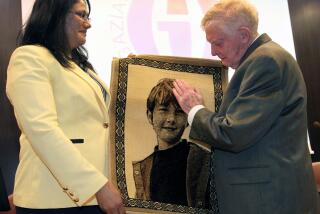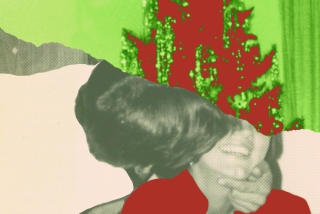The loss that gives
- Share via
Fifteen years ago, during a family vacation in southern Italy, my 7-year-old son, Nicholas, died after being shot in a botched robbery. I knew then that I could never be really happy again.
Maggie -- my wife -- and I are not gloomy people. And with three other lively children, our home is not a mournful place. But, as I sensed then, the realization that Nicholas’ radiant life was snuffed out still colors all my thinking. I think of all the books he will never read, the friends he will never meet, the sunsets and mountains and starry skies he will never see.
What I never expected was the emotional upsurge around the world that followed our decision to donate his organs and corneas to seven very sick Italians, four of them teenagers. Telegrams, flowers, even toys for our 4-year-old daughter, Eleanor, flooded in from all parts of Italy. The president and prime minister came to see us and talked to us as if they were old family friends. An Italian military aircraft, with an honor guard, brought Nicholas’ body home to California.
Individual gestures of solidarity sprang up immediately and have never ceased. A small bakery dressed its employees in coveralls with “Thank you, Nicholas” logos on them. Parks, bridges, schools and streets from the Alps to Sicily -- and the largest hospital in Italy -- are named for him. For years, a school in Sicily has had two clocks in its entrance hall, one showing the time in Italy, the other in California, so that students will feel the connection every day. Italians of all ages feel so close to him that they refer to him not by his full name but as “piccolo Nicholas,” little Nicholas.
More important, the rates of organ donation in Italy have more than quadrupled since his death, going from 4.2 per million inhabitants in 1994 to 18 per million last year. As a result, thousands of people are alive who would have died, and every year hundreds more are saved.
But the effect stretched far beyond Italy. To this day, we receive e-mails from around the world. Some are dramatic, like those from people who donated a loved one’s organs because they were moved by our story. Most, however, are from people who simply want to tell us that they have not forgotten what happened and that it has, in some way, changed their view of life. A woman wrote recently to say that as a child in Iran, she had written an essay on Nicholas and that she still feels close to him.
I still cannot think of Nicholas without feeling that life has lost an essential ingredient, but I also recognize that more good came out of his death than I had any right to expect.
In the last 15 years, transplantation has been undergoing a transformation too. Almost 500,000 organ transplant operations have been done in the United States since the pioneering days of the 1960s. There also have been millions of tissue transplants -- corneas that restore sight, skin that heals burns, bone that straightens spines. Once thought of, if thought of at all, as a rare, risky and slightly weird medical procedure, organ donation is now familiar enough to be featured on front pages and in prime-time TV series. It’s rare for me to meet an adult who doesn’t know someone who has had, or may need, a transplant.
Techniques have improved dramatically, so that even as transplants have become the procedure of choice for ever-older, ever-younger and ever-sicker patients, survival rates have gone up. Now, for example, 87% of heart recipients are alive after one year, 71% after five years. Given that all these people were terminally ill, many on the threshold of death, the results speak for themselves.
There is a simple way for you to express your willingness to be an organ donor: Just tell your family it is something you want. It doesn’t have to be a big deal -- but should they ever be asked to make such a decision, they will know they are carrying out your wish.
In most states, you can register your decision so that it becomes legally binding. In California, you can sign up online any time at www.donatelifecalifornia.org, or whenever you renew your driver’s license. A single donation usually produces three or four organs, so your decision could save three or four families, just like your own, from devastation. There is also all that tissue, which can relieve the pain and fear of many more.
When the doctors told Maggie and me that Nicholas was brain dead, the people who would receive his organs were just abstractions to us, without faces or histories. But now that we have met them -- and know what would have happened to them if we had shrugged off their problems as none of our concern -- I cannot imagine how we could have made any other choice.
More to Read
Sign up for Essential California
The most important California stories and recommendations in your inbox every morning.
You may occasionally receive promotional content from the Los Angeles Times.













